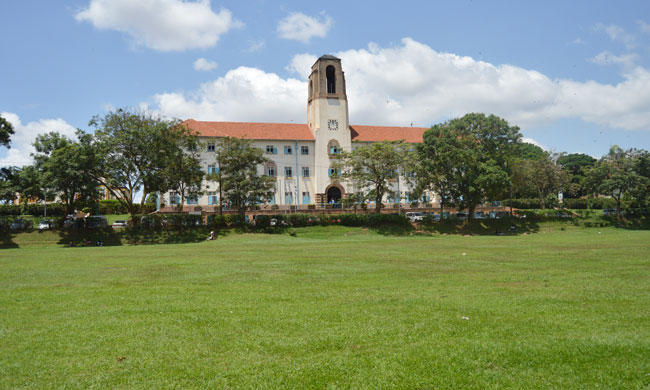The Academic Registrar Makerere University announces the online applications for the Pre-Entry Examination for admission to the Bachelor of Laws for 2020/2021 Academic Year. This advert has been revised due to the current situation in the country caused by coronavirus disease 2019 (COVID-19)
To be eligible to sit the examination, Applicants must possess the minimum admission requirements of the University, and any one of the following specific requirements:
- ) `A’ Level leavers: Must hold an ‘O’ Level Certificate (UCE) or its equivalent with at least 5 Passes plus ‘A’ Level Certificate (UACE) or its equivalent having obtained a minimum of 13 points (Males) and 12 points (for Females) in any ‘A’ Level combination for both Humanities and Sciences. Candidates who did ‘A’ Level before 2013 should have 15 and 14 points for male and female applicants respectively.
- ) Diploma Holders: Must possess at least a 2nd Class or Credit Diploma from a chartered institution. Certified Copies of Diploma Transcripts (No Provisional Results) from the Awarding Institutions must be submitted when collecting the invitation letters after the university opens.
- ) Mature Age Applicants: Must have passed the Makerere University Mature Age Entry Examination (for Bachelor of Laws) for either 2019/2020 or 2020/2021 Academic Year. Government sponsorship is only for those who sat Mature Age Exams for 2020/2021 Academic Year and applied for it.
- ) Degree Holders: Must be graduates in any Discipline from a Chartered University. Certified Copies of Degree Transcripts (No Provisional Results) from the Awarding Institutions must be submitted when collecting the invitation letter after opening the university. (Degree holders are not eligible for government sponsorship)
N.B.
All applicants wishing to be admitted to the Bachelor of Laws programme offered by Makerere University are required to sit and pass the pre-entry examination of Makerere University.
All applicants interested in Government sponsorship must have applied for Bachelor of Laws Government (Code: LAW) by filling in the Government sponsorship application form. Applicants interested in Private sponsorship for Day (Code: LAW), Afternoon (Code: LLA) and Law Executive (Code: LLE) will apply for admission after passing the bachelor of laws pre-entry examination.
All applicants who hold Diplomas and Degrees must present a certified copy of the academic transcript. Provisional results shall not be accepted to register for this examination.
Applicants should note that admission is based on performance in the pre-entry examination and intake capacities for government, private day and private evening for all categories i.e ‘A’ Level, Diploma Holder, Mature Age, Degree holder and international applicants. Details of available slots for each category could be accessed at the university website.
All Applicants must present the original academic documents to the academic Registrar’s Office at Makerere University when collecting the invitation letters.
Applications for those intending to sit the examination are online after payment of a Non-refundable Application Fee of Shs. 110,000/- including six past papers, excluding the Bank charges paid in any bank after getting an AIMS system(https://admissions.mak.ac.ug/) generated reference number.
The closing date for submitting the completed Application Forms is Monday 25th May, 2020.
The Pre-Entry Examination shall cover the following areas:
- Reading and Comprehension Skills
- Language Skills5
- Numerical Skills and Logic
- General Knowledge
- Analytical Writing Skills
HOW TO APPLY
(i)Application is now online due to the current state of affairs for all applicants for Pre-Entry Examinations for Bachelor of Laws.
(ii). The applicant should log onto https://admissions.mak.ac.ug/ using any web browser preferably Google Chrome.
(iii). After loading the https://admissions.mak.ac.ug/ page, the applicant should then click the orange "SIGN UP NOW" tab/button to register their details (ensure you do not forget the registered login details which include the email-address, mobile number and password. The phone number and email-address should preferably be those of the applicant and not a third party).
(iv). Once successfully logged in, the applicant should look for the "Pre-entry examinations(Bachelor of Laws) scheme, August intake 2020/2021" and then click the blue tab/button to start the application process.
(v). For additional guidelines, the applicant should click the link to view instructions.
(vi)The date for Invitation Letters and date of Examination for pre-entry for Bachelor of Laws will be communicated when the University opens.
Alfred Masikye Namoah
ACADEMIC REGISTRAR
25th March, 2020


 General2 weeks ago
General2 weeks ago
 Agriculture & Environment2 weeks ago
Agriculture & Environment2 weeks ago
 General1 week ago
General1 week ago
 Health2 weeks ago
Health2 weeks ago
 Research2 weeks ago
Research2 weeks ago


